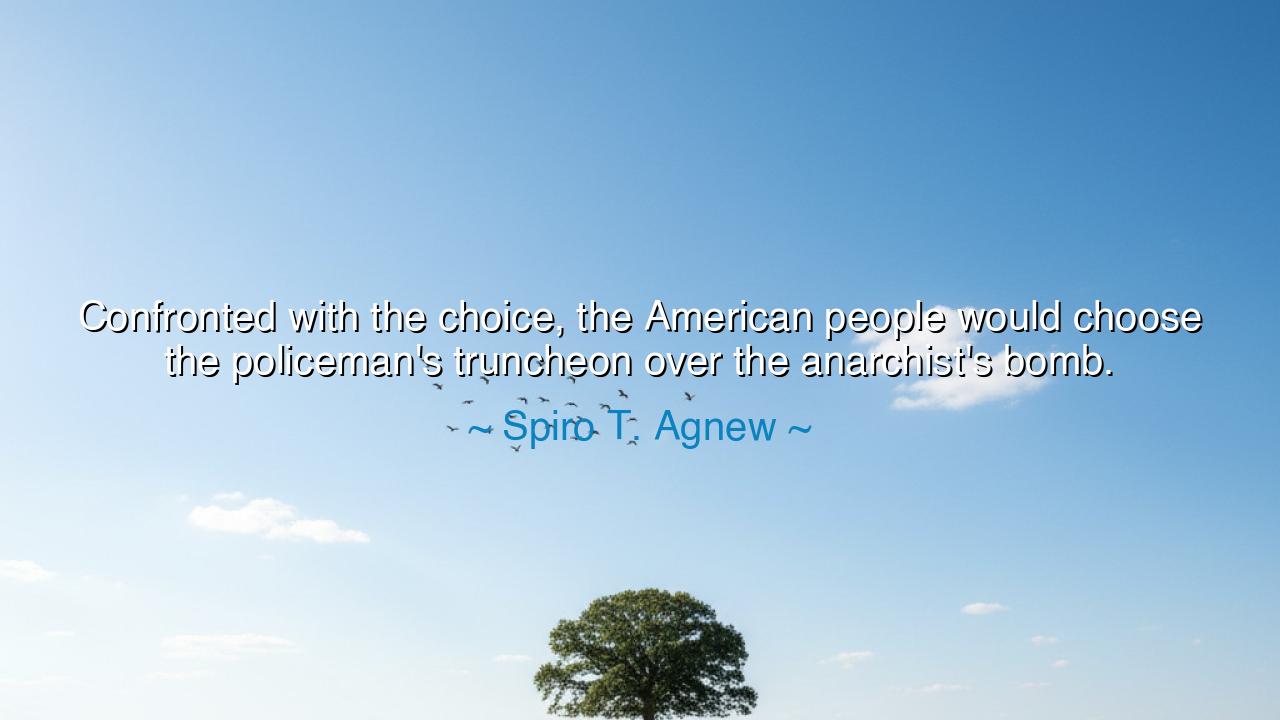
Confronted with the choice, the American people would choose the
Confronted with the choice, the American people would choose the policeman's truncheon over the anarchist's bomb.






Spiro T. Agnew, vice president in a time of fire and turmoil, once declared with iron certainty: “Confronted with the choice, the American people would choose the policeman’s truncheon over the anarchist’s bomb.” In this saying he laid bare the instinct of nations when faced with chaos. Between the harshness of authority and the terror of destruction, the people, weary of uncertainty, will cling to order, even if it is enforced with the rod. For the truncheon, though it bruises, promises safety; the bomb, though it shouts of freedom, brings only fear.
The origin of this thought arose in the convulsions of the 1960s and 70s, when America was riven by protest, riot, and revolution. The Vietnam War raged, cities burned, campuses erupted, and voices of dissent challenged the very foundations of the state. Agnew, stern defender of authority, saw in this turmoil the danger of anarchy. His words warned that the common people, confronted with violence in the streets, would side not with the agitators but with the guardians of law—even if those guardians wielded truncheons with heavy hands.
History bears witness to this truth. In the days of the French Revolution, the people overthrew monarchy in the name of liberty, but when terror filled the streets with guillotines and mobs, they longed for order. Thus Napoleon, the soldier with the iron hand, was welcomed as savior. His bayonet, though sharp, seemed preferable to the bomb of endless revolt. Agnew’s words echo this lesson: when chaos devours safety, men will barter liberty for stability.
So too in modern America, when protests turned violent, public opinion often shifted. The civil rights movement triumphed when it held fast to nonviolence, for its moral power outweighed the policeman’s club. But when radicals turned to riots or bombs, sympathy waned, and the people looked again to the state. The anarchist’s bomb may shout of liberation, but the people hear only danger; the policeman’s truncheon may sting, but it carries the promise of a roof unburned and a street unbroken.
Therefore, O seekers of wisdom, remember Agnew’s lesson, harsh though it may be: authority, even when flawed, is preferred to chaos. The people’s heart beats not only for freedom, but for safety, for home, for peace. To win their trust, reformers must build not bombs but hope, not terror but vision. For a truncheon can be overcome by justice, but a bomb can never plant the seeds of liberty.






Ssayhiwithmee
Agnew’s statement seems to suggest that the public's fear of disorder outweighs their desire for autonomy or self-determination. But could it be that people, when faced with real-world issues, might choose neither the truncheon nor the bomb? Would they prefer alternatives that allow them to express their grievances without resorting to violence or surrendering to authoritarian control?
NMPhung Nguyet Minh
This quote makes a compelling argument for why some might favor security over freedom during moments of crisis. But it also raises the question: how much power should be placed in the hands of authority? While the truncheon may promise safety, what happens when authority oversteps and violates the very freedoms it's meant to protect? Can there be a balance?
ALAnh Le
The notion that people would choose the policeman’s truncheon over the anarchist’s bomb implies a preference for control, but does it ignore the potential dangers of authoritarianism? Is it possible that people might crave more freedom and autonomy, even if that comes with some level of instability? Does this view understate the complexity of how the American public might react to such a choice?
MCMai Chi
Agnew’s quote touches on a tense dichotomy between order and chaos. It suggests that in moments of crisis, people are likely to choose safety over upheaval. But is that the only way to think about societal conflict? Could the public also feel alienated by the overreach of authority, or is this fear of anarchy something that clouds their judgment during tense times?
HAHuynh Huu Hoai An
Spiro T. Agnew's statement seems to paint a stark picture of societal choices: stability and order through authority versus chaos and violence through radical action. But does it oversimplify the situation? Is it really a clear-cut decision for the American people, or are there many who would prefer a third option—a society with fewer extremes and a more balanced approach to justice?